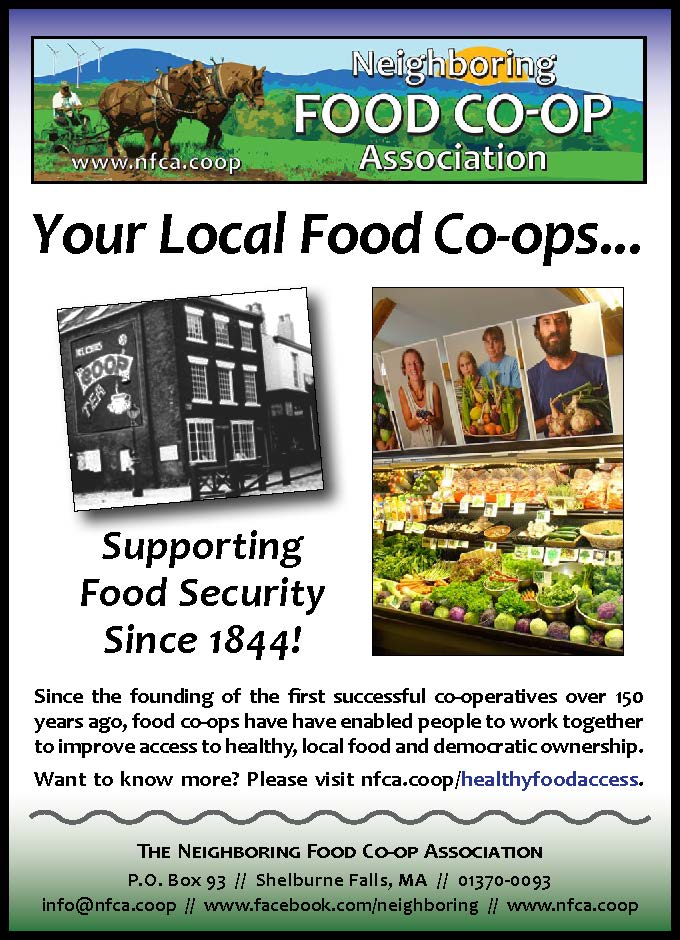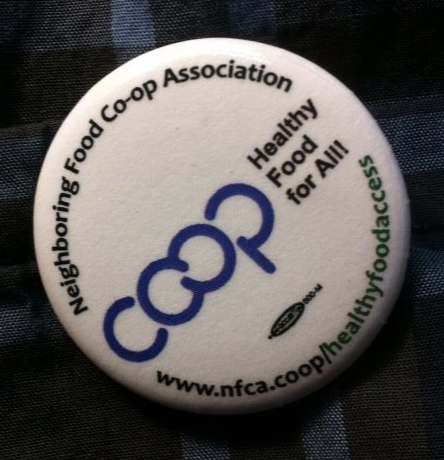By Erbin Crowell & Bonnie Hudspeth, Neighboring Food Co-op Association
 Imagine you are a poor mill worker in the north of England in the mid 1800s. The Industrial Revolution has made production more profitable, but it has also cost skilled artisans their jobs and concentrated wealth and control among a small group of factory owners. Many in the community are unemployed, while others don’t make enough to afford basic groceries. What would you do to provide healthy food for your family? How might you work with your neighbors to improve the lives of people in your community?
Imagine you are a poor mill worker in the north of England in the mid 1800s. The Industrial Revolution has made production more profitable, but it has also cost skilled artisans their jobs and concentrated wealth and control among a small group of factory owners. Many in the community are unemployed, while others don’t make enough to afford basic groceries. What would you do to provide healthy food for your family? How might you work with your neighbors to improve the lives of people in your community?
On December 21, 1844, after years of organizing and experimentation, a group of weavers, workers and community activists opened a modest grocery store on Toad Lane in Rochdale, England. Their goal was to provide basic goods members such as butter, flour, oatmeal and candles. Their vision, however, was a transformation of the food system and economy.
“What was the motivation of the Rochdale Pioneers, who codified the values and principles on which the co-operative movement has based since 1844?” asked Dame Pauline Green, President of the International Co-operative Alliance. “We know it today as food security.”
At a time when access to nutritious food was limited and adulterated products were common, the Pioneers saw an urgent need for an alternative. The co-operative movement that they helped launch now includes over a billion members around the world and operates in nearly every sector of the food system and economy. From food co-ops to farmer co-ops, worker co-ops to credit unions, co-operative enterprise has empowered people to have more control over their lives and communities.
Today, the results of the global recession have dramatically affected the ability of people to provide themselves and their families with healthy food. In the U.S., 23.5 million Americans (including 6.5 million children) live in areas with limited access to affordable and nutritious food, particularly in low-income neighborhoods and communities. In New England, the relative cost of high-nutrition less processed foods is among the highest in the country, when compared to low-nutrition, highly processed foods. Additionally, childhood obesity rates are higher in many parts of the region than the national average.
In this context, it may come as no surprise that people are again turning to co-operative enterprise for solutions. Food co-ops in New England have been pioneers and innovators in food security. Some date back to the Great Depression, while others were founded in the 1970s and 80s, emerging as community-based responses to limited access to healthy, affordable food. In recent years, a new wave of food co-ops has emerged, reflecting growing interest in local foods and democratic ownership. Rooted in their communities, co-operative enterprises are an effective tool for building healthy food access, stable markets for local producers, and sustainable jobs.
 As food security has again emerged as an urgent issue in our region, the Neighboring Food Co-op Association (NFCA) has been working to develop solutions that balance financial sustainability with offering healthy affordable food, supporting local economies, and building fair relationships with workers and producers. In collaboration with the New England Farmers Union, Cooperative Fund of New England, and Hunger Free Vermont, the member co-ops of the NFCA are sharing what they have learned from “healthy food access” programs already in place, and supporting their neighboring food co-ops to roll out these programs and create new approaches to make healthy food and member-ownership more accessible.
As food security has again emerged as an urgent issue in our region, the Neighboring Food Co-op Association (NFCA) has been working to develop solutions that balance financial sustainability with offering healthy affordable food, supporting local economies, and building fair relationships with workers and producers. In collaboration with the New England Farmers Union, Cooperative Fund of New England, and Hunger Free Vermont, the member co-ops of the NFCA are sharing what they have learned from “healthy food access” programs already in place, and supporting their neighboring food co-ops to roll out these programs and create new approaches to make healthy food and member-ownership more accessible.
In the last year alone, six food co-ops have implemented new “Food For All” programs, offering community members with limited income access to co-op member-ownership and discounts on their groceries every time they shop.
In their day, the Rochdale Pioneers saw a solution to their challenges in economic empowerment through democratically governed, community-owned businesses (co-ops). As we gather to celebrate the holidays together, our Neighboring Food Co-ops are reaching back to their roots, building on a legacy of food security as we move forward together, continuing to use the co-op business model to find solutions to the challenges of our time.
To learn more about the Neighboring Food Co-op Association’s Healthy Food Access work, visit: www.nfca.coop/healthyfoodaccess.
Feel free to re-print this article in your co-op newsletter, and let us know when you do!: info@nfca.coop

